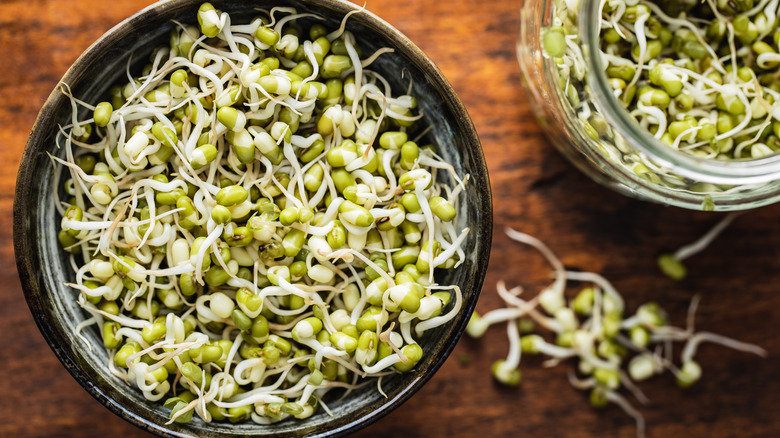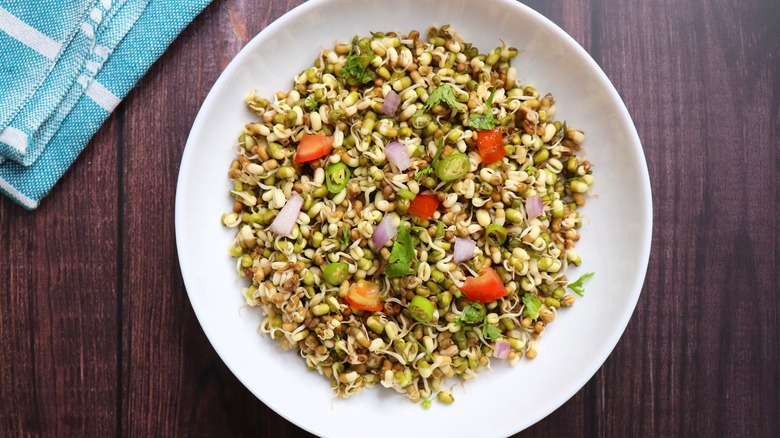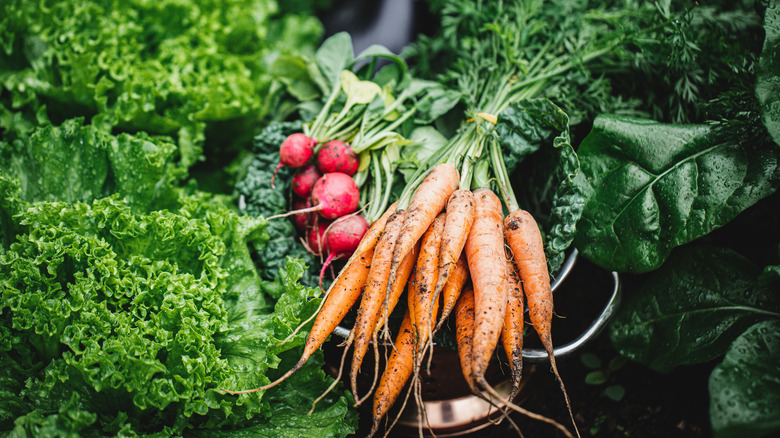Why You Should Think Twice Before Ordering Anything With Raw Sprouts
Just because a certain food is nutritious doesn't mean you should eat it any chance you get and in any form you find it. Take the case of sprouts: They are packed with important nutrients, but when eaten raw, they can cause food poisoning (per Healthline). Sprouts are essentially whole grains that have been soaked in water for several hours until they germinate. This process increases the quantities of nutrients such as iron, folate, zinc, vitamin C, and even protein that are already present in whole grains, making sprouts more nutrient-dense than their non-germinated counterparts. However, germination also opens these grains up to the risk of contamination.
Grains are sprouted in a moisture-filled environment that is between 70 to 85 degrees Fahrenheit — a temperature that falls squarely within what the USDA defines as the "danger zone" because, although necessary for germination, this environment is also where bacteria such as salmonella, E. coli, and listeria grow and multiply very quickly. Cooking the sprouts can kill the harmful bacteria, so when you eat them raw — especially outside your home where you know nothing about how safely the sprouts were handled — you risk ingesting these germs. Those nutritious little sprouts could very well end up doing you more harm than good!
Tips to eat sprouts safely
While skipping raw sprouts when eating out is perhaps for the best, any raw sprouts — whether consumed outside or in the safety of your home — are just as susceptible to contamination. Sprouts can be contaminated at any point — from when the grains grow on farms to how they are packed, stored, and transported. So, even if you decide to carefully sprout a batch of grains yourself at home, you won't necessarily be in the clear.
Cooking the sprouts until they are scalding hot is paramount, but it isn't the only precaution you can take. When shopping for store-bought sprouts, make sure to only pick up containers that have been properly refrigerated. Even then, be sure to put them back in the refrigerator as soon as you get home to limit the sprouts' exposure to the warm danger zone. Toss out anything that smells off or looks dark, slimy, and soggy — sprouts should be nothing but bright and crunchy. Rinse the sprouts in cool water when you're ready to eat them, and then proceed with cooking; boil them in salted water, saute them with butter, or even use them in your bakes — the possibilities are endless and delicious!
Alternatives for raw sprouts
Some people may be more susceptible to food poisoning through raw sprouts — including pregnant people, kids, the elderly, and those with compromised immune systems — but it's always best to ensure that any sprouts you eat are always fully cooked. If, for any reason, that is not an option, you can always substitute them with other alternatives — especially if it's the bright taste or the crisp texture that you're after in things like soups, salads, stir-fries, and noodles.
The best place to start looking for alternatives to the texture of raw sprouts is in the vegetable drawer. Raw, peeled, and shredded carrots are an excellent replacement, as are shredded cabbage, broccoli stems, celery, and radishes. All of these veggies, when sliced thinly, will bring the fresh crunch that you'd sorely miss from the loss of raw sprouts. Canned beans are easy substitutes too, especially because they are packed with their own set of nutrients.
If you're hoping to make up for the earthy, fresh flavor that raw sprouts would bring to the mix, bamboo shoots, water chestnuts, bok choy, and umami-rich enoki mushrooms are fantastic alternatives. As a bonus, bamboo shoots will even bring the crunchiness that you'd expect from raw sprouts. Considering the many alternatives, there is really no need to take the risk of eating sprouts raw!



